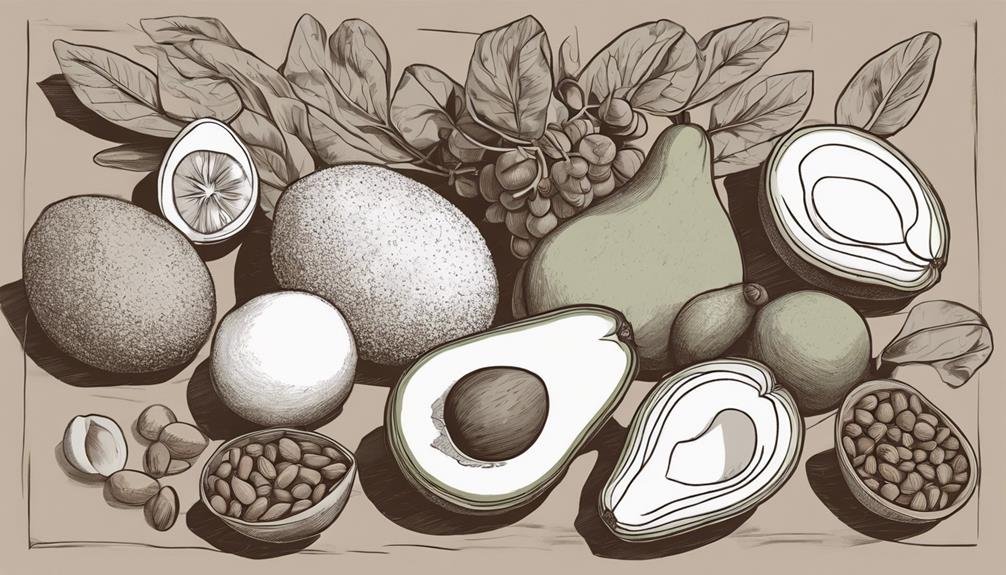Intermittent Fasting: Optimize Testosterone After 40 Naturally
Intermittent fasting can effectively optimize your testosterone levels naturally after 40. By choosing a flexible eating pattern, like the 16/8 method, you enhance insulin sensitivity and regulate hormone levels. This approach not only supports weight management but also boosts energy and mental clarity, important for a healthy lifestyle. Incorporating zinc-rich foods, healthy fats, and leafy greens during your eating windows further promotes testosterone production. Prioritizing quality sleep and regular exercise will also help you maintain hormone balance. Explore how these strategies can transform your health and elevate your energy levels.
Key Takeaways
- Implement intermittent fasting methods like 16/8 to enhance insulin sensitivity and support testosterone production naturally.
- Focus on consuming zinc-rich and healthy fat foods during eating windows to promote hormone balance.
- Engage in regular strength training and cardio exercises to boost testosterone levels and overall energy.
- Prioritize quality sleep and manage stress effectively to maintain hormonal health as you age.
Understanding Intermittent Fasting
Intermittent fasting is a flexible eating pattern that alternates between periods of eating and fasting, allowing you to manage your weight and improve your overall health.
You can choose various methods, like the 16/8 method, where you fast for 16 hours and eat during an 8-hour window, or the 5:2 approach, which involves eating normally for five days and restricting calories on two non-consecutive days.
This approach helps regulate insulin levels, enhances fat burning, and can lead to improved metabolic health.
As you integrate intermittent fasting into your routine, you might find it easier to control hunger and cravings, making healthier food choices.
Plus, it can fit seamlessly into your lifestyle, making it sustainable long-term.
Testosterone and Aging

As men age, their testosterone levels naturally decline, often leading to changes in energy, mood, and muscle mass. You might notice you tire more easily or struggle to maintain the same level of strength you once had. This drop in testosterone can also affect your libido and mental clarity, making daily activities feel more challenging.
While aging is a natural process, understanding how testosterone impacts your body can empower you to take action. Factors like diet, exercise, and lifestyle choices play a significant role in how testosterone levels fluctuate. By addressing these areas, you can mitigate some of the negative effects of aging and help maintain your vigor as you navigate your 40s and beyond.
Benefits of Intermittent Fasting
Understanding the benefits of intermittent fasting can be an effective strategy to support testosterone levels, especially as you age.
One major advantage is weight management; by restricting your eating window, you may find it easier to maintain a healthy weight, which is essential for hormone balance.
Additionally, intermittent fasting can enhance insulin sensitivity, helping your body utilize glucose more effectively.
Improved energy levels and mental clarity during fasting periods can also boost your motivation to engage in regular exercise, further supporting testosterone production.
Furthermore, many people experience better sleep patterns with intermittent fasting, which is critical for overall hormone health.
How Fasting Affects Hormones

Fasting influences several key hormones in your body, ultimately impacting your overall health and testosterone levels. During fasting, insulin levels drop, which can enhance fat burning and improve insulin sensitivity. Additionally, human growth hormone (HGH) levels may increase, promoting muscle growth and fat loss.
Here's a quick breakdown of how fasting affects these hormones:
| Hormone | Effect of Fasting | Impact on Health |
|---|---|---|
| Insulin | Decreases | Improves insulin sensitivity |
| Human Growth Hormone | Increases | Enhances muscle growth |
| Testosterone | Can increase or stabilize | Supports energy and libido |
Best Practices for Fasting
To maximize the benefits of intermittent fasting, it's essential to adopt effective strategies that fit your lifestyle and health goals. Here are some best practices to take into account:
- Choose a Fasting Window: Pick a time frame that works for you, like 16/8 or 18/6, to maintain consistency.
- Stay Hydrated: Drink plenty of water throughout your fasting period to help manage hunger and support overall health.
- Listen to Your Body: Pay attention to how you feel; if you're overly fatigued or unwell, reassess your approach.
- Avoid Processed Foods: Focus on whole, nutrient-dense foods during your eating window to fuel your body effectively.
Implementing these practices can enhance your fasting experience and support your testosterone levels.
Foods to Enhance Testosterone

Incorporating specific foods into your diet can considerably boost your testosterone levels and overall health.
Focus on foods rich in zinc, like oysters, beef, and pumpkin seeds. These can help stimulate testosterone production.
Healthy fats from avocados, olive oil, and nuts also play an important role in hormone production, so include them regularly.
Don't forget about leafy greens, such as spinach and kale, which are high in magnesium, another essential mineral for testosterone balance.
Additionally, consider adding cruciferous vegetables like broccoli and cauliflower to your meals, as they can help lower estrogen levels.
Lifestyle Tips for Hormone Balance

Balancing your hormones goes beyond diet; adopting certain lifestyle habits can greatly enhance your testosterone levels and overall well-being. By making small yet impactful changes, you can support hormonal health effectively. Here are some tips to take into account:
Prioritize Sleep: Aim for 7-9 hours of quality sleep each night to support hormone production.
Stay Active: Engage in regular exercise, mixing strength training with cardio for best benefits.
Manage Stress: Incorporate mindfulness practices like meditation or yoga to reduce cortisol levels.
Limit Alcohol: Cut back on alcohol consumption to prevent negative effects on testosterone.
Maintain a Healthy Weight: Focus on a balanced lifestyle to achieve and maintain a healthy body weight.
Embrace these habits to help you achieve better hormone balance.
Questions
Can Intermittent Fasting Help With Weight Loss After 40?
Yes, intermittent fasting can help you lose weight after 40. It promotes fat burning, improves insulin sensitivity, and controls hunger, making it easier for you to stick to a healthier eating pattern. Give it a try!
How Long Should I Fast for Optimal Testosterone Levels?
Imagine fasting for days, feeling energized and empowered! For ideal testosterone levels, aim for a daily fasting window of 16 to 20 hours. You'll likely notice improvements in your mood and liveliness.
Are There Any Risks of Intermittent Fasting for Older Adults?
Yes, there are risks of intermittent fasting for older adults. You might experience fatigue, nutrient deficiencies, or blood sugar fluctuations. It's essential to consult a healthcare professional before starting any fasting regimen to guarantee your safety.
Can Intermittent Fasting Improve Libido in Men Over 40?
You might notice a boost in libido after trying intermittent fasting. For instance, a 45-year-old man found that regular fasting improved his energy and interest in intimacy, enhancing his overall sexual health and satisfaction.
What Supplements Are Best to Take During Intermittent Fasting?
During intermittent fasting, consider taking electrolytes, magnesium, and omega-3 supplements. They'll help you maintain energy levels, support your metabolism, and reduce inflammation. Remember, it's essential to consult a healthcare professional before starting any supplements.
Conclusion
Incorporating intermittent fasting into your routine can be a game-changer for optimizing testosterone levels naturally after 40.
By understanding how fasting impacts your hormones and making smart dietary choices, you can boost your overall health and energy.
Isn't it time you took charge of your hormonal balance?
With the right practices and lifestyle adjustments, you can access a healthier, more energetic you—one meal at a time.
Start your journey today and feel the difference!







